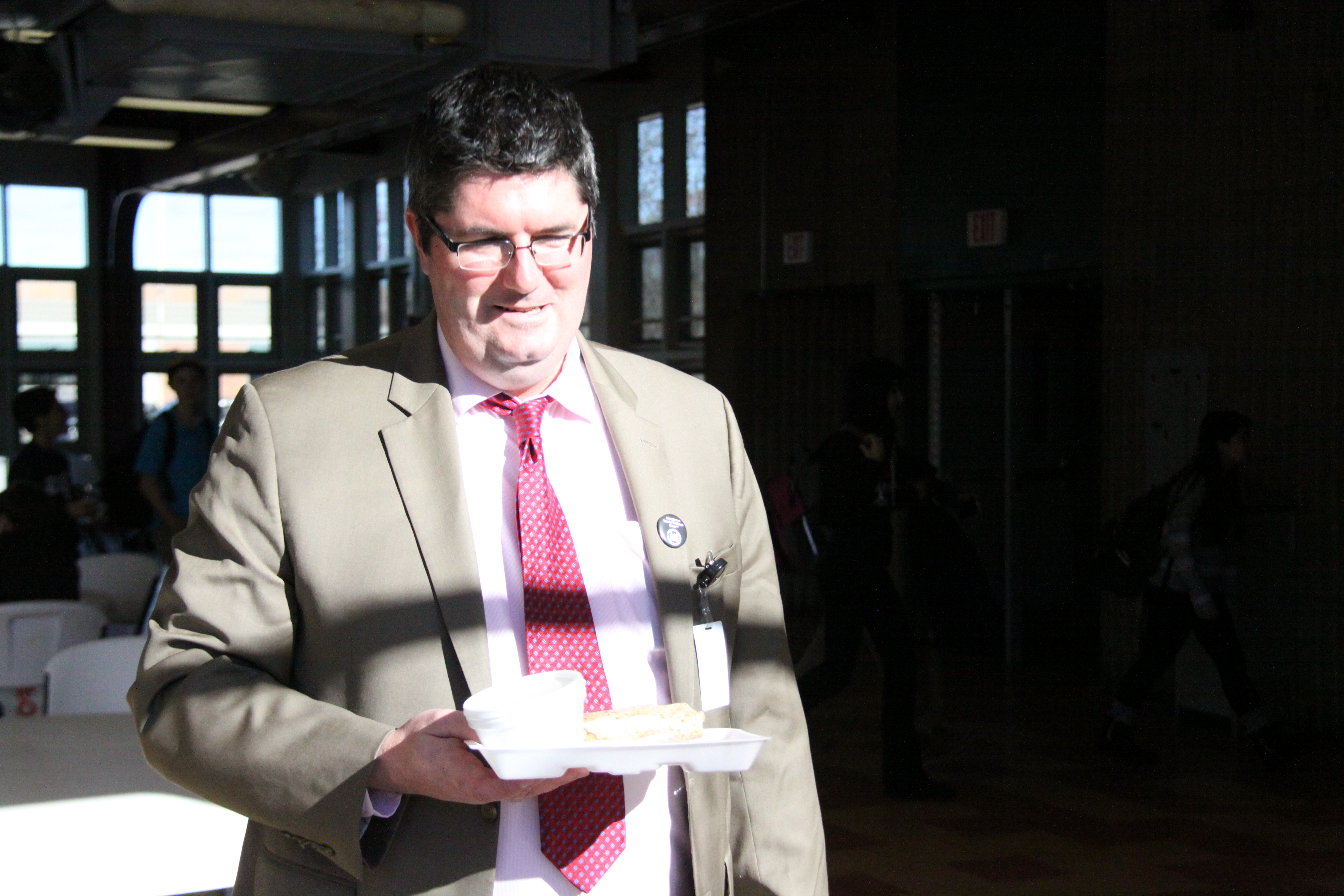
At Concord-Carlisle High School, math teacher Sue Ravalese is already using some of the new Common Core curriculum. (WGBH/Kirk Carapezza)
Part one of a two-part series on the new Common Core standards, focusing on a high-performing school in a Boston suburb.
This story was co-produced with the education news organization The Hechinger Report.
Concord, Mass.: Home to the transcendentalists like Henry David Thoreau and Ralph Waldo Emerson.
It's also home to Concord-Carlisle High School, where on this day Principal Peter Badalament meets with guidance counselors.
Walking the halls of his high school, Badalament says he's proud of Concord's history, which, a few years ago, he incorporated into a special curriculum called “Rivers and Revolutions.”
"It's almost an understatement to say it's an interdisciplinary program," he said. "Fifty students a semester go into the program and it's almost like they're going abroad for the semester."
It's the kind of learning experience seen at select high schools in the U.S. Students learn trigonometry in the morning, then they hike down to the Concord River.
"And use that trigonometry to figure out how far it is across the river," Badalament said. "And while they're there, they'll read some Emerson."
That's the kind of interdisciplinary work that Badalament says may suffer as a result of new Common Core standards, which put a greater focus on nonfiction and technical texts that students have to read in college or on the job.
“If we’re going to really be serious about having students read more difficult things, we have to slow down," said David Coleman, the so-called architect of Common Core. In his presentations to teachers across the country, he has strongly defended the new standards. “Even for the advanced student, that slow, careful consideration of something is the only way they ever achieve depth and, I would argue, ever really read altogether.”
The Massachusetts Department of Education voted to adopt this new approach three years ago and will soon be implementing the same curriculum here that students in 44 other states are following.
That’s exactly why some people object to the program.
"Massachusetts has shown incredible progress," said Jim Stergios, executive director of Pioneer Institute, a conservative, Boston-based think tank that focuses on education.
Stergios points out that Massachusetts has much higher standards than other states, and is already competing with high-performing nations like Japan and South Korea.
"It's not just because of charter schools," he said. "It's not just because of specific changes in terms of governance within district schools. It's also because we set the highest expectations in the country for our kids, and we thought they could reach that."
So why would a state with a proven track record change its standards?
Stergios says it’s because the state had a huge financial incentive — $250 million in federal dollars.
"When there is money flying around, everybody is supportive," he said. "Legislators did not even know what Common Core was, not only in Massachusetts, but around the country."
Back in Concord, Math teacher Sue Ravalese is already using some of the new curriculum. Ravalese dismisses the notion that the new standards will hold Massachusetts students back. In fact, she thinks Common Core will actually require her students to develop better critical thinking skills.
“We’re focusing on the mathematical practice of being able to construct arguments and justify their work and critique other people’s work," she said.
When she first started teaching, Ravalese says the approach was to stand and deliver a lecture with very little interaction.
“I would present the material," she said. "We’d go through problems together and then they would practice.”
For years, Ravelese and other teachers have been slowly revamping the school’s curriculum, making it more interactive. She says parents shouldn’t be concerned about the Common Core standards.
"There’s always going to be a pacing issue," she said. "There's the misperception that kids won’t get trigonometry or calculus. However, trigonometry will be in earlier classes. So they will definitely get to that higher math content.”

Concord-Carlisle High School Principal Peter Badalament likes that Common Core will require deeper understanding of math concepts, but he's withholding judgment about whether the new standards will better prepare his students for college and careers - one of their main goals. (WGBH/Kirk Carapezza)
Badalament is also concerned about preparation time, since the state wants the new curriculum fully adopted this fall.
"When are we supposed to do that?" he asked. "That's a pretty common reaction these days."
For now, schools in Massachusetts and elsewhere are phasing in the new standards, giving teachers an opportunity to get used to them, while educators try to figure out how they’re going to measure their effectiveness.










